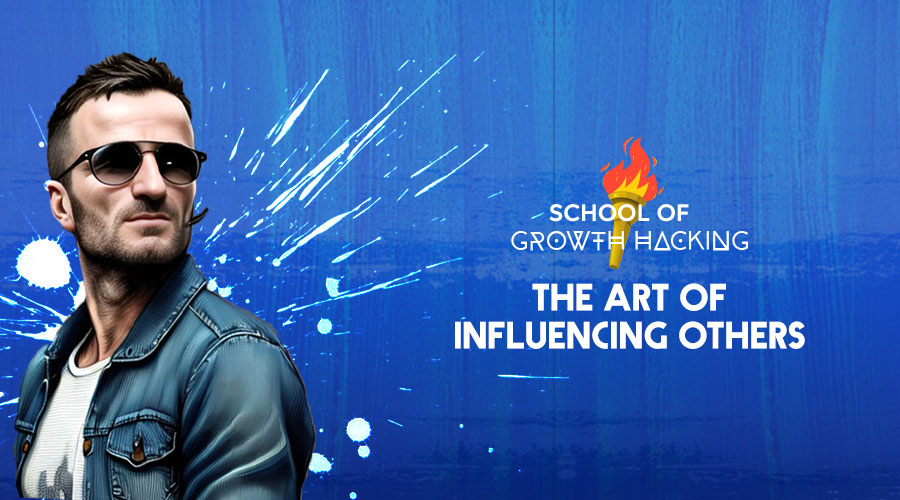
This post is from the “Partner and Profit” course @ the School of Growth Hacking. If you like this article, you’ll love the course with 50+ lessons like this one. Use the discount code “leaderme$#2023” to get 20% off the entire course.
If you were to look through my private Google documents that I have under my account, you would see that I have all kinds of different templates that I use for relationship building, for reaching out to new people, and developing partnerships.
And nowadays I kind of take a lot of the techniques I use for granted, but when I was starting out I had to learn everything meticulously.
One of the first important lessons about persuasion that really stuck with me over years was from a book I read “Persuasion: Six Weapons of Influence.”
And these “six weapons of influence” explain in detail how and why people agree to things, such as our proposals, or our invitation to connect.
These six weapons are: reciprocity, commitment / consistency, social proof, authority, liking, and scarcity.
Reciprocity: When someone does a favor for us, we feel inclined to return it.

One example of reciprocity in action is when a waiter or waitress brings you a small mint or candy with the bill at the end of a meal. This small gesture often leads to customers leaving a larger tip because they feel obligated to return the favor.
Another example is when a charity sends you personalized address labels or other small gifts in the mail, with the hope that you’ll feel obliged to make a donation in return.
Authority: Who is the person, is he trustworthy?

A doctor wearing a lab coat is a classic example of authority at work.
By wearing a lab coat, the doctor signals to patients that they are an expert in their field, which can make patients more likely to trust and follow their recommendations. Another example is when a celebrity endorses a product. Consumers may trust the product more because they assume the celebrity has expertise or authority in the area. Sometimes actors wear a doctor’s coat in advertisements, even when they are not actually a doctor, just to create the feeling of authority.
Social Proof: What do other people say about this person or product?

A classic example of social proof. is when you pass by a restaurant and you see a long queue down the street. This can create the impression that the restaurant must be good because so many people want to eat there. When I’m in Malaysia, I see this all the time, especially in Penang, which is considered a foodie haven with many popular street stalls. Similarly, I see it in Singapore when I’m at the hawker center and the locals queue for their favorite places.
Social proof is often used in advertising. For example, a toothpaste ad might say, “Four out of five dentists recommend this toothpaste.” The implication is that if four out of five dentists recommend it, it must be good..
Liking: We do favors for people if we like them.

A common example of liking at work is when salespeople attempt to build rapport with potential customers.
They might ask about the customer’s interests or hobbies, try to find common ground, and generally try to be friendly and likeable. This can make the customer more likely to buy from them.
Another example is when a celebrity endorses a product. If consumers like the celebrity, they may be more likely to buy the product.
Commitment / Consistency: We feel the urge to honor our word and follow through, to remain consistent to what we commit to.

An example of this can be seen in a study conducted by Cialdini himself, where he asked people to sign a petition to “Keep California beautiful.”
Those who signed the petition were much more likely to agree to place a large “Drive Safely” sign on their front lawn than those who didn’t sign the petition. This is because those who signed the petition made a commitment to the cause, and placing the sign on their lawn was a way of being consistent with that commitment.
Scarcity: When something is scarce, we value it more. Similarly, when it’s only available for a limited time, we need to make a decision quickly.

When something is scarce, we value it more. Similarly, when it’s only available for a limited time, we need to make a decision quickly.
One classic example of this is the Black Friday and Cyber Monday sales.
I remember when I was a kid, Nintendo was accused of limiting the number of gaming consoles they made available, and the parents sometimes had to line up for hours, even days and even trample each other in order to get their hands on these items, otherwise their kids would be crying constantly.
The limited time and availability of the products make them more valuable and desirable to consumers. Another example is a limited-edition product. I remember how proud and accomplished I felt to get a golden cartridge version of The Legend of Zelda 64. People are willing to pay more for these items because they know they may not be able to get them later.
All of these are important in their own right, for the purpose of relationship building, my favorite is the law of reciprocity.
Relationship building should be a mutual give and take. You shouldn’t only be giving and just helping people all the time, and you shouldn’t only be trying to take from others all the time. It’s a balance of giving and asking.
Good luck, and drop a comment or reach out to me if you have any questions.
If you like this article, you’ll love the “Partner and Profit” course. Use the discount code “leaderme$#2023” to get 20% off the entire course.

Images in this article courtesy of Freepik.com





